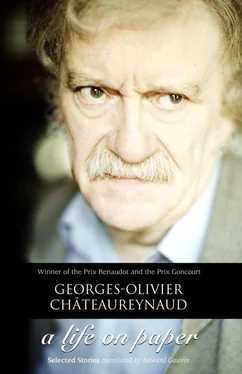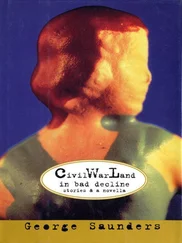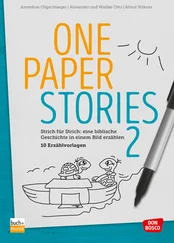Georges-Olivier Chateaureynaud - A Life on Paper - Stories
Здесь есть возможность читать онлайн «Georges-Olivier Chateaureynaud - A Life on Paper - Stories» весь текст электронной книги совершенно бесплатно (целиком полную версию без сокращений). В некоторых случаях можно слушать аудио, скачать через торрент в формате fb2 и присутствует краткое содержание. Год выпуска: 2010, Жанр: Современная проза, на английском языке. Описание произведения, (предисловие) а так же отзывы посетителей доступны на портале библиотеки ЛибКат.
- Название:A Life on Paper: Stories
- Автор:
- Жанр:
- Год:2010
- ISBN:нет данных
- Рейтинг книги:4 / 5. Голосов: 1
-
Избранное:Добавить в избранное
- Отзывы:
-
Ваша оценка:
- 80
- 1
- 2
- 3
- 4
- 5
A Life on Paper: Stories: краткое содержание, описание и аннотация
Предлагаем к чтению аннотацию, описание, краткое содержание или предисловие (зависит от того, что написал сам автор книги «A Life on Paper: Stories»). Если вы не нашли необходимую информацию о книге — напишите в комментариях, мы постараемся отыскать её.
A Life on Paper
A Life on Paper: Stories — читать онлайн бесплатно полную книгу (весь текст) целиком
Ниже представлен текст книги, разбитый по страницам. Система сохранения места последней прочитанной страницы, позволяет с удобством читать онлайн бесплатно книгу «A Life on Paper: Stories», без необходимости каждый раз заново искать на чём Вы остановились. Поставьте закладку, и сможете в любой момент перейти на страницу, на которой закончили чтение.
Интервал:
Закладка:
He spent an unsettled afternoon smoking and watching the waves, reading Lalena's letter and draining the bottle of whisky he'd brought her as a gift, thinking about life in general and that damned word in particular, about his bad luck in having to bear, inscribed and spelled out, the final word on the human condition… He'd taken off his shirt. There it was, quite legible, the same blue as the sea. He found it especially despicable that day: insolent, triumphant in the vacuity of waiting. When he was good and drunk, he scratched at the word until it bled, and asked Claveton to burn it with his lighter. All he'd have to do was get it patched up by the medic when they got back, and then they'd never have to speak of it, there'd be a pretty scar in its place; he didn't care about the pain, it was a price he was ready to pay.
Ever cautious when beyond the base's perimeter, Claveton hadn't had so much as a drop to drink. He refused to burn Francois. Did he, Claveton, have to do the thinking for both of them? What about Colombani? If the Barge found out, he wouldn't let it rest. Self-inflicted wounds or mutilation in a zone of operations, with enemy right next door? You could get yourself court-martialed for that. Francois flew into a rage. He ordered Claveton to do it. Claveton replied that as a private second class, he didn't have to take orders from another private second class. Francois called him a dumbass and tried himself to burn the few square inches of his own skin that were poisoning his life. He moved the flame toward his chest, screamed, and dropped it. All he'd managed was a blister. He finished off the whisky to dull the pain. When the reporters honked from the road, Claveton called them over to help. They had a hell of a time hauling Francois into the Range Rover.
Francois didn't try to find Lalena after his discharge. The letter with the phone number in Geneva had remained on the beach by the house, along with the empty bottle. Besides, when he gave it more thought, he came to the conclusion that Lalena'd had nothing, or almost nothing, to do with it. Perhaps her skin had only been a catalyst? He had but to close his eyes to remember how soft she'd felt, how sweet she'd smelled… That was it: his skin had reacted to contact with hers, and this was the result. Why not? What did anyone know? What did anyone have time to understand about this dark, embroiled world, by the wavering light of their mind and senses, in the span so meanly allotted to them? He figured he'd have to riddle it out on his own. His idea of burning it off hadn't altogether been bad, just a bit crude and brutal. After all, plastic surgery hadn't been created for dogs. When he got back to France, he made an appointment with a dermatologist. If it resembled a tattoo, it could be removed like a tattoo. The night before his visit, he was full of hope. The nightmare was about to end. He would forget this ridiculous affair, all that pathos in such poor taste, and once more be a normal, decent man who thought about death only once in a while. He took a sleeping pill, drained his nightly glass of water down to the last drop, and slept like a child.
The next day, about to step into the shower, he found that with the exception of his face and neck, his entire body-even his prick, even the soles of his feet-was covered with writing. Scrawled in thick awkward capitals, penned in dainty cursive, even calligraphically scripted, the word "Mortal" a thousand times over bound him in a blue web, like the tangled weave of a net flung on him from above. He knew then he would never be free, and burst into tears.
Later, when he'd calmed down, he called the dermatologist and cancelled his appointment. Slowly, in the months that followed, the flare-up receded; things went back to normal. All that remained on his skin was the one original word, where it had first appeared. As before, it flickered with the passing days-regularly and peacefully, on the whole-the pilot light of a terror now so deep-set as to be inseparable from life's own daily rounds.
Lozere, December 1992
The Peacocks
 still recall: we had such confidence, we'd set out to devour the world, to conquer it all, even the planets and the starry void be- vond the skies, it was all our America, a land promised and delivered, and then the quiet, stubborn things wore us down as words wear away an eraser.
still recall: we had such confidence, we'd set out to devour the world, to conquer it all, even the planets and the starry void be- vond the skies, it was all our America, a land promised and delivered, and then the quiet, stubborn things wore us down as words wear away an eraser.
We were living in a house in the country, Marie and I and two peacocks. Mornings I liked to let her sleep in, pale in the shadowsan eye, a cheek, a rounded shoulder, a leg sometimes surfacing from the sheets as though from quicksand. I'd step outside. In the yard, a peacock was turning toward the rising sun. I'd whistle, calling out to that handsome idiot: come, come to your master, my colored one, my brightly bedecked swaggerer, come! He'd freeze and fix an empty round eye on me. He'd been dreaming; he woke to my whistle, alarmed at being in the world. His mate soon joined him. They stared at me, waiting for God knows what, or perhaps it was simple-watching and waiting for the golden shower of grain that poured each morning from my hands. I was God. I fulfilled their expectations, reaching deep into a sack for wheat that disappeared into the cracks between the porch floorboards-eat, you dumb animals. There, just like that, then groom your feathers, and peck, or cluck, whatever it is you peacocks do, what good are words now anyway, they'll all be forgotten soon.
I'd close up the sack and lean it against a wall in the foyer. Cross the yard and open the gate. We never forgot to close it at night. In a world now safe as a tomb, I held on to this pathetic, childish ritual. I'd take a few steps out into the road, the king stepping from the Louvre to his death. The road was empty.
The village wasn't far away. If I'd wanted, I could've pushed on to the next bend. I would've passed, lost in the fog, a bell tower; a few chimneys without smoke; an isolated shack, once a military outpost, long loud with grunts. A neighbor had kept pigs there. We'd often stop there on the way to the market, when there'd still been a market. Marie loved little piglets, little kids, little gifts. Whenever we were walking she always found something to pet-a puppy, a kitten, a calf, a lamb to coo over, a child to coddle. I stayed a few steps behind, hands in my pockets, urging her to keep walking. The only small things she hated were her breasts, and complained about them till the very end.
I'd go back inside.
We'd inherited all humanity had to offer. Books, music, paintingsthey were all ours. At first, Marie put on a different dress each time she put another record on the player. To listen better, she said, to feel more. Maybe we wouldn't have made it through the early days without acting silly, going a bit crazy. Whenever we came back from a spree I'd open the crates and we'd try out canned food, alcohol, candy, test out fabrics; I was saving the books for later. Marie was bewitched by a music box. She had thirty other ones already, the prettiest… That's not all, I said, wait'll we unload the piano and the wing chair and the desk. We set to it clumsily-her in a nightgown and me in an alpaca suit and were soon out of breath. The peacocks watched us struggle under the weight of the marquetry-excited, sweating, egging ourselves on with swigs of wine. That night, though the truck was still half full and we hadn't finished setting up-to tell the truth, we never really finished-we set the table among the furniture and crates. And ate, drank, were merry. All that crystal, porcelain, silver, and silk, for us alone. Sometimes Marie draped herself in the biggest, heaviest jewels she could find, and sometimes she wore only one, tiny and chosen with great care from among the thousands in her chest. Sometimesoften-she dined in a wedding dress that she'd throw out the next day, tossing it, sauce- or champagne-stained, into the well behind the house. We had drawers and drawers of baroque lingerie with charming, ridiculous names-Rita, Gypsy, Barcarolle, Lady Luck, Nina, Snowy Lace. I dressed up as a commodore, an admiral, anything flashy and official-gold trim, epaulettes, medals galore-and we'd dance.
Читать дальшеИнтервал:
Закладка:
Похожие книги на «A Life on Paper: Stories»
Представляем Вашему вниманию похожие книги на «A Life on Paper: Stories» списком для выбора. Мы отобрали схожую по названию и смыслу литературу в надежде предоставить читателям больше вариантов отыскать новые, интересные, ещё непрочитанные произведения.
Обсуждение, отзывы о книге «A Life on Paper: Stories» и просто собственные мнения читателей. Оставьте ваши комментарии, напишите, что Вы думаете о произведении, его смысле или главных героях. Укажите что конкретно понравилось, а что нет, и почему Вы так считаете.












